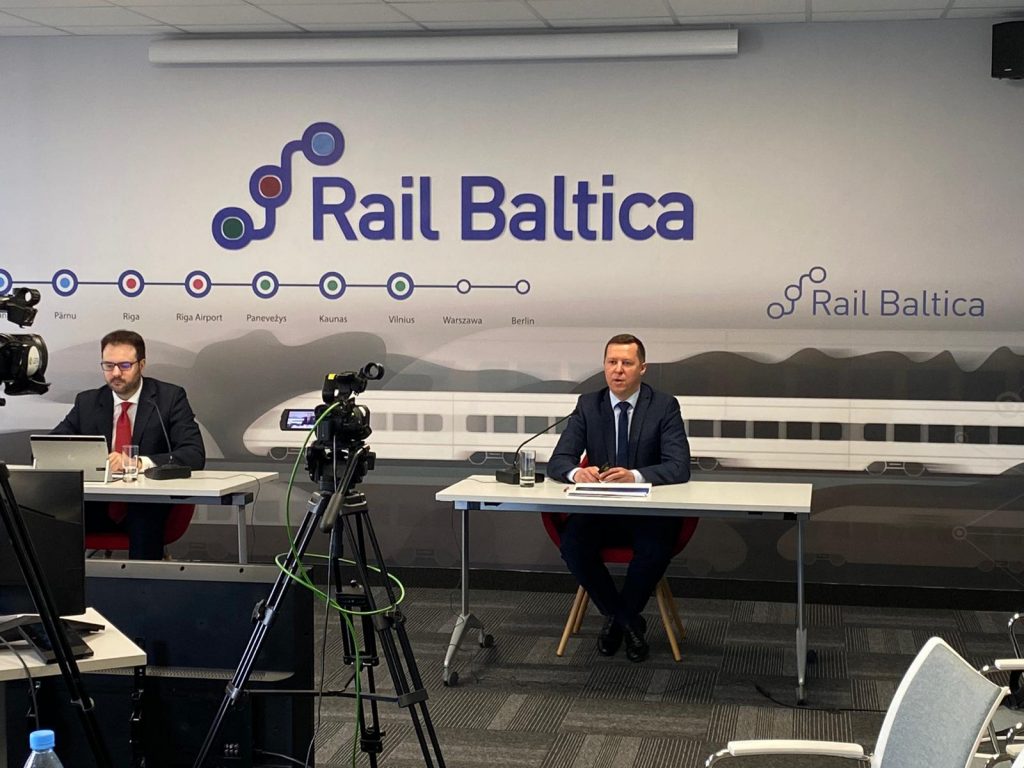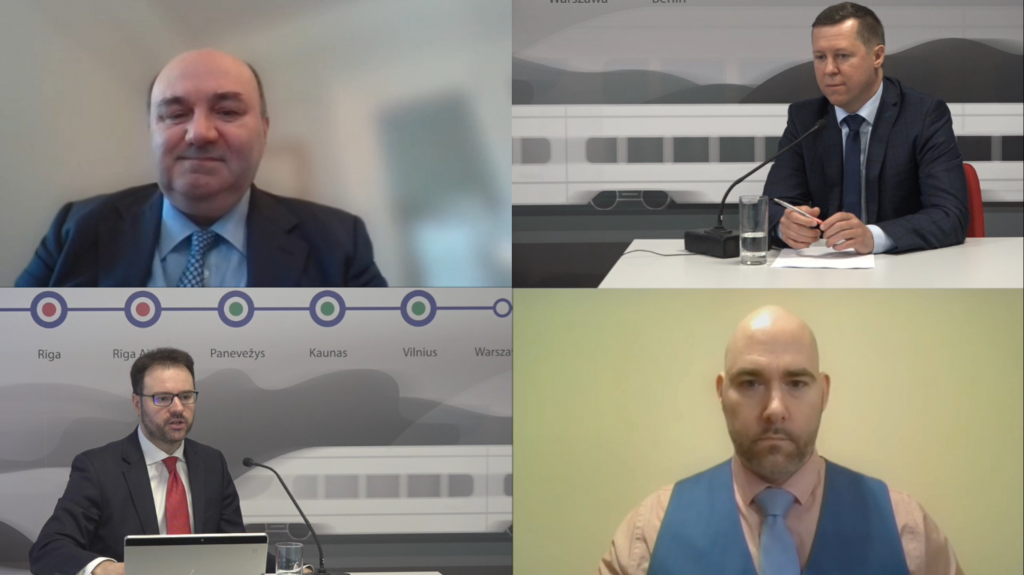Today the Rail Baltica Online Forum gathered 1000 online viewers from 39 countries, which included suppliers, industry professionals and other parties interested to learn more about the Rail Baltica project progress and plans for 2020. During the livestream, RB Rail AS representatives introduced the main upcoming tenders, project timeline and strategic direction for the construction procurement as well as long-term development activities.
The Online Forum was opened with video addresses by the European Commissioner for Transport Adina Vălean and Transport Ministers of the Baltic States – Taavi Aas, Minister of Economic Affairs and Infrastructure of the Republic of Estonia, Tālis Linkaits, Minister of Transport of the Republic of Latvia and Jaroslav Narkevič, Minister of Transport and Communications of the Republic of Lithuania. The ministers emphasised the project’s role in the post-Covid economic recovery and shared a strong commitment to complete the project on time.
Adina Vălean, European Commissioner for Transport emphasised that a swift progress in the current design phase and quickly upscaling of construction activities is essential in achieving the ambitious goal of opening Rail Baltica operations in 2026. She also noted, “The EU budget should be the primary tool at the European level to kick-start our economies and drive our recovery towards a greener, more resilient and digital Europe. Projects such as Rail Baltica will contribute to all of these dimensions. Investments in sustainable transport infrastructure will be more important than ever in relaunching the economy and making our continent more resilient, in line with the European Green Deal.”
 By 2026 the total Rail Baltica investment in the Baltic States will reach EUR 5.8 billion, where up to 85% will be generously co-funded by the European Union. It will provide a significant boost to the local construction, engineering and other service industries. During the peak of the construction works from 2022-2025, Rail Baltica will create approximately 13 000 new jobs in the construction industry, with 24 000 indirect and induced jobs in related industries, such as material sourcing and component manufacturing, logistics, hospitality and catering, professional services and many others.
By 2026 the total Rail Baltica investment in the Baltic States will reach EUR 5.8 billion, where up to 85% will be generously co-funded by the European Union. It will provide a significant boost to the local construction, engineering and other service industries. During the peak of the construction works from 2022-2025, Rail Baltica will create approximately 13 000 new jobs in the construction industry, with 24 000 indirect and induced jobs in related industries, such as material sourcing and component manufacturing, logistics, hospitality and catering, professional services and many others.
The implementation of the Rail Baltica project continues uninterruptedly during the state of emergency in all three Baltic States. Agnis Driksna, RB Rail AS Chairperson of the Management Board reported, “We are not only delivering the detailed technical design in all of Estonia, Latvia and in two sections of Lithuania, but also developing plans to prepare for the large-scale construction works ahead. The focus is on setting up a procurement system that would enable quality, cost-efficiency and speed in the delivery of construction works and allow both international and local companies to take part in the project”.
Project timeline and plans for 2020
Mark Loader, RB Rail AS Chief Program Planning Officer and Member of the Management Board provided an insight into the short-term design and construction plans in all three countries and the contracting approach. “Rail Baltica timeline is an ambitious one. Nevertheless, with the right tools and comprehensive planning and risk mitigation in place we are in a good position to reach this goal. More importantly, we have a clear understanding of the scope of the project and the necessary funding for the current needs has been secured.”
In parallel to the detailed technical design of the main line in all three Baltic States, the project plan for 2020 will also focus on the development of passenger stations, freight terminals and railway maintenance facilities.
 In Estonia, the technical design of the Rail Baltic passenger terminals in Tallinn and Pärnu will continue. A procurement will be launched to start the technical design of freight terminals, rolling stock and service depos. In addition, the construction of more than 20 rail-road viaducts and animal crossings is planned.
In Estonia, the technical design of the Rail Baltic passenger terminals in Tallinn and Pärnu will continue. A procurement will be launched to start the technical design of freight terminals, rolling stock and service depos. In addition, the construction of more than 20 rail-road viaducts and animal crossings is planned.
In Latvia, the focus will be on starting construction works in the Riga Central Station and the signing of the Riga airport section contract by the end of 2020. Design of the multimodal terminal in Salaspils will begin along with additional environmental impact assessments and a study railway network development in Riga node.
In Lithuania, construction works in Kaunas railway transport node are in progress and a construction tender will be launched for the construction of the main line section from Kaunas to the Lithuanian/Latvian state border. In addition, special planning is ongoing for the section Vilnius – Kaunas and soon will be ongoing for the sections Kaunas node and Kaunas – Lithuanian/Polish state border.
Globally, RB Rail AS is developing a construction procurement strategy and a consolidated material procurement strategy to prepare for the large-scale construction works. Additionally, RB Rail AS will launch two key system procurements for the energy subsystem engineering services and for the control, command and signaling system engineering. The joint venture will further study Rail Baltica transport demand and develop the Global Project marketing strategy.
Procurement and funding
In 2020, nearly EUR 200 million of the EU funding is planned to be used for various project activities in all three Baltic States. By now, the project has secured EUR 941 million of the CEF funding and national co-funding, as well as a financing application has been submitted for another EUR 781 million to be invested by the end of 2023 demonstrating maturity of the project.
With the spending volume increasing each year, the Rail Baltica procurement system is being continuously improved in order to ensure efficiency and transparency. As a result, RB Rail AS has concluded a highly competitive and economically advantageous procurement of the detailed technical design procurement for 643 km of the line, resulting with 39 proposals from 16 international and local tender participants. More importantly, the designs delivered during the procurement process were within the planned budget.
